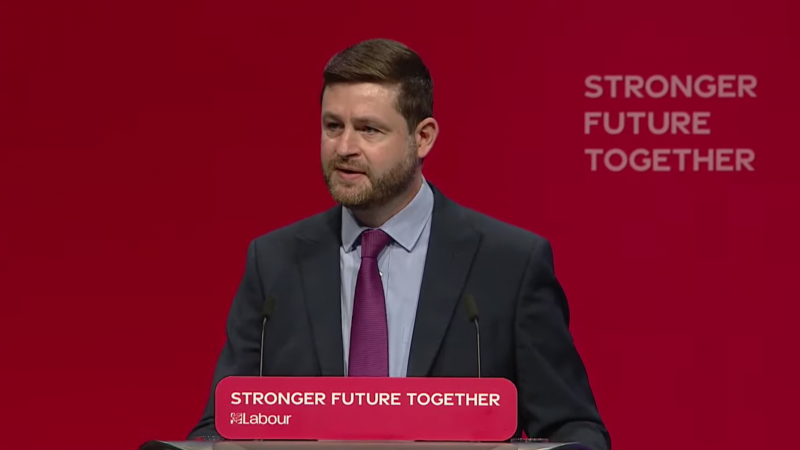
Labour is set to force a vote on the introduction of its bill to “end the Tory sewage scandal”, with Jim McMahon warning Conservative MPs ahead of the debate that their constituents “will be watching” how they vote.
The party has also released another contentious attack ad focused on the issue, claiming Prime Minister Rishi Sunak thinks it is “right to allow raw sewage to be dumped into our rivers and beaches 800 times a day”.
Labour tabled an opposition day motion on Tuesday on providing parliamentary time next week for the water quality (sewage discharge) bill to be considered and voted on by MPs.
Opposition day motions are not directly binding on the government, but Labour’s motion would guarantee time in the parliamentary schedule for its bill, which would force MPs to actively vote for or against the legislation.
Commenting ahead of Tuesday’s debate, the Shadow Environment Secretary said: “It is clear that we have a Tory government that has run out of ideas, only regurgitating old announcements that do nothing to end sewage dumping. That is why Labour has brought forward legislation to clean up our water system.
“Today, Tory MPs have an opportunity to support Labour’s water quality bill, which will put an end to sewage dumping once and for all. Their constituents will be watching to see if they will put the best interests of our country before their party.”
Labour said a vote on the bill would give Conservative MPs “another opportunity to vote to end sewage dumping”, highlighting that a majority of Tory MPs rejected an amendment to the environment bill in 2021 that would have legally required water companies to reduce the amount of sewage discharged into waterways.
If passed, the bill – which was introduced by McMahon in March – would mandate the Environment Secretary to publish a strategy for the reduction of sewage discharges as well as to provide regular economic impact assessments.
The legislation would also set a legal requirement for the monitoring of all sewage outlets, impose penalties for failures to adhere to monitoring requirements, introduce automatic fines for sewage dumping and establish a legally binding target to reduce sewage dumping events.
Commenting on Labour’s plans, Labour Coast and Country co-founder Hywel Lloyd said: “Good to see Labour address a clear and present danger to coast and country communities everywhere, be that for people who are wild swimmers, running local SMEs or simply going about their waterside.
“Look forward to further action from Labour on all the utilities, who all too often seem to act as if they are above local needs or local accountability.”
Both Labour and the Liberal Democrats have attacked the government’s record on sewage discharges in the run-up to the local elections in May.
Labour will end the Tory sewage scandal. pic.twitter.com/pXBJftbsCZ
— The Labour Party (@UKLabour) April 25, 2023
The Environment Agency revealed at the end of last month that there were more than 300,000 raw discharges into rivers and coastal areas in 2022, lasting for more than 1.75 million hours.
Commenting at the time, Keir Starmer said sewage dumping was “ruining so many areas of our country” and accused the Conservatives of “sitting on their hands, with no response to it”. The Labour leader promised that his party would take “real action on this scandal” if it comes into government.
Environment minister Rebecca Pow acknowledged that the volume of discharges was “unacceptable” but said the government is “taking action to make sure polluters are held to account”.
Therese Coffey was criticised earlier this month following the announcement of the government’s plan for water, after she claimed that people who say they can stop the sewage spills are “either detached from reality or being definitively dishonest”.
The Environment Secretary said upgrades to the sewer network would “put hundreds of pounds on people’s bills”, arguing: “There’s no way we can stop pollution overnight. If there were, I would do it without hesitation.”
The government’s plan for water includes £1.6bn of investment in infrastructure intended to tackle pollution and increase water resilience, with £1.1bn to be spent on storm overflow improvements to reduce discharges.
The plan will see water company fines and penalties put into a new water restoration fund, with the government also launching a consultation on strengthening the ability of the Environment Agency to issue penalties to water companies for damaging the environment.
Commenting on the government’s plan, Wildlife and Countryside Link head of policy and advocacy Matt Browne argued that a “comprehensive plan” to deliver on a “long-term target for the health of our waters” has yet to be brought forward.
“With so much of our wildlife and waters struggling under the weight of pollution, development and overuse, only a well-focused, well-resourced and far-reaching plan will turn the tide for nature,” he said.
The Department for Environment, Food and Rural Affairs has been contacted for comment.




More from LabourList
Nudification apps facilitate digital sexual assault – and they should be banned
Diane Abbott suspended from Labour after defending racism comments
Labour campaign groups join forces to call for reinstatement of MPs